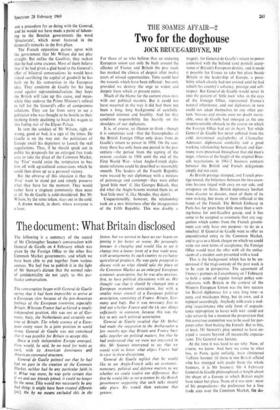The document: What Britain disclosed
The following is a summary of the record of Mr Christopher Soames's conversation with General de Gaulle on 4 February which was given by the Foreign Office to the other five Commoft Market governments. and which we have been able to put together from various sources. We feel free to publish it in the light of Mr Stewart's dictum that the normal rules of confidentiality do not apply to this par- ticular conversation.
The conversation began with General de Gaulle .saying that it had been impossible to arrive at a European view because of the pro-American feelings of the European countries, especially Britain. Whereas France had achieved a totally independent position, this was not so of Ger- many, Italy, the Netherlands and certainly not true of Britain. The whole essence of a Euro- pean entity must be a joint position in world terms. General de Gaulle was not convinced that it was possible for Britain to accept this.
Once a truly independent Europe emerged, there would, he said, be no need for NATO as such, with its American dominance an American command structure.
General de Gaulle pointed out that he had had no part in the creation of the Common Market, neither had he any particular faith in it. What was more, he was quite certain that if we and our friends joined, it could no longer be the same. This would not necessarily be any bad thing: it might have been created different [sic]. He by no means excluded this in the
future, but we seemed to have set our hearts on joining it for better or worse. He personally foresaw it changing and would like to see it change into a looser form of a free trade area. with arrangements by each country to exchange agricultural products. He was quite prepared to discuss with us what should take the place of the Common Market as an enlarged European economic association, but he was also anxious, first, to have political discussions with us. His thought was that it should be changed into a European economic association, but with a smaller inner council of a European political association; consisting of France. Britain, Ger- many and Italy. But it was necessary first to find out whether France and the tuc saw things sufficiently in common, because this was the key to any such political association.
General de Gaulle recalled that Mr Debre had made the suggestion to the Ambassador a few months ago that Britain and France have talks together on political matters, but that he had understood that we were not interested in this. Mr Soames intervened to say that we would wish to know what object France had in view in these discussions.
General de Gaulle replied that he would like to see Anglo-French talks on economic. monetary, political and defence matters to see whether we could resolve our digerences. But first he would like to see a gesture by the British government suggesting that such talks should take place. He would then welcome that gesture.


































 Previous page
Previous page